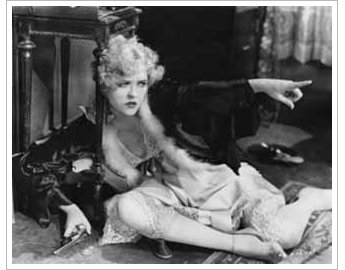By Marilyn Ferdinand
In 2002, the filmed version of the Bob Fosse/Kander and Ebb musical Chicago won the Academy Award for best picture. It was a stunningly great film with a message for our media-manipulated times. The genesis of these works was a hit Broadway play from 1926 by Maurine Watkins, a Chicago Tribune reporter who sensationalized the stories of two female murderers and contributed to their acquittals at trial. One of the killers was Beulah Annan, a glamourous and adulterous party girl who, in 1924, shot her lover, Harry Kalstedt, when he announced he was leaving her. The other was Belva Gaertner, a cabaret singer who gunned down her lover Walter Law as he sat in his car. The larger-than-life producer and director Cecil B. De Mille grabbed the rights to the play, and the result is the 1927 film Chicago.

Chicago takes up the story of only one of the murderers, Beulah Annan, who becomes Roxie Hart in the film. Played by Phyllis Haver, she is a beautiful, golden-haired waste of space who is only interested in money and fame. Her straight-arrow husband Amos (Victor Varconi) adores her. He picks up one of her garters as she sleeps, a gaudy contraption with bells on it, and shakes it lovingly near his ear. Later, he waits on a man at his tobacconist shop. This man, Rodney Casley (the great character actor Eugene Pallette), takes an interest in some cigarettes for ladies whose advertising suggests your woman will stay with you if you buy her these cigarettes. Casley laughs that he’s trying to unload his woman. Amos drips that if Casley had his wife, he’d never want to be rid of her. In fact, we learn they are talking about the same woman, Roxie, when Casley fumbles in his pocket for his wallet and comes up with the other silver-belled garter.
Casley goes to meet Roxie to end their affair. She persists in trying to keep him, but he pushes her roughly against the wall and knocks her bureau over. Out spills a gun. As Casley opens the door and steps out into the hall with the words “I’m through” on his lips, Roxie says, “You’re through, all right,” and shoots. A bullet shatters a mirror on the door, and passes through, hitting Casley. The broken mirror is a brilliant spidery image, followed by an equally brilliant depiction of Roxie’s reaction to what she’s done. We never see Casley’s body, only Roxie looking at it as she tries to maneuver around it. You can see the wheels turning in her, trying to figure out what to do, wondering if he’s really dead, being disgusted by the dead body in her front room. She tears the piano roll out of the player piano; this is a reference to the Annan murder in which it was reported that a recording of “Hula Lou” was playing on Annan’s victrola as Harry lay dying in a pool of blood.
Roxie calls Amos, who comes running and phones the police. They and a male reporter show up. Amos tries to take the blame, but the sly assistant district attorney (Warner Richmond) traps Roxie by saying Amos said she did it. She goes ballistic, accusing her husband of ratting her out. Of course, he did no such thing, and the heartless Roxie realizes she’s been set up. Nonetheless, the reporter is thrilled by her seductive good looks and has his cameraman pose her as remorse itself while a cop stands in for the dead man on the floor.

The scenes in prison while Roxie awaits arraignment are clever and all too short. Roxie’s all-out fight with another woman on murderer’s row, who is strapped in to a hip-reduction machine, is comic and a little frightening. The wit and sardonic humor of this film is just as piercing as in the 2002 film, and most of it is done without words. Haver gives a knockout performance, showing the difficulty Roxie has being anything but a chippie. When her attorney Billy Flynn, played with cynical grace by Robert Edeson, has her rehearse her brave, sweet, innocent, and noble looks before they face the jury, she needs a lot of coaching. He puts her in a cream puff of a dress that we are told is pink and has her carry a bouquet in her hands. She looks like an overgrown infant with a nosegay to ward off the smell of her own rotten character. The trial ends with Flynn snatching the bouquet from her hands, tossing it to the floor, and stamping on it. Roxie flings herself on the broken blossoms and passes out. “The defense rests,” Flynn murmurs. You bet it does!
The director of record was Frank Urson, but the hand of De Mille is in clear view, particularly in his tedious moralizing. Amos Hart is on screen way too much, stealing money from Flynn to make up the rest of the $5,000 he needs to hire the lawyer for Roxie in a completely unnecessary scene, and flinging Roxie into the streets, trashing the apartment, and stomping on her photo in a moralistic rage, knowing that he helped her get away with murder. The film should have ended with Roxie disappearing into the crowd on the uncaring streets of Chicago, but we are shown that good triumphs as the Hart’s maid Katie (Virginia Bradford) cleans up the apartment and is poised to become the good wife Amos deserves.
Seeing Chicago in a beautifully restored print at the Chicago International Film Festival was an extremely rare treat. This film is only available to scholars through the UCLA Film & Television Archive. We were privileged to have the film introduced for us by David Robinson, the foremost authority on Charlie Chaplin and the author of numerous books about film. Finally, the unsung hero of Chicago silent film, Dave Drazin, accompanied Chicago on electric piano. I have heard Drazin many times at Gene Siskel Film Center and other silent-film screenings, and his gift for accompanying silent images is awe-inspiring. Here’s hoping that UCLA will see fit to send this funny and fascinating film on the road in the near future.
Marilyn Ferdinand is The Beachwood Reporter‘s resident film critic, and the proprietor of Ferdy on Films. Her exclusive coverage of the Chicago International Film Festival includes:
* “Better Than Fiction,” her opening guide to the festival.
* “Corruption and Comedy,” a review of The Comedy of Power, a French New Wave film whose themes will be instantly recognizable to anyone with even the sketchiest knowledge of Chicago politics.
* “Soul in Flames,” a review of Requiem, a remarkable film about modern-day possession and exorcism.
* “A Talent for Torment,” three reviews in one (Spirit of the Soul, Ode to Joy, Steel City) from a disappointing day at the festival.
* “Deep in the Heart of Dixie,” a review of Dixie Chicks: Shut Up and Sing, the inside story of the Dixie Chicks’ political and personal journey as Southern girls ashamed of their Texan president.
* “Boot Straps and Black Boys,” a review of Shoot the Messenger, a British film that challenges standard racial notions in part by featuring a character who might best be described as a black Joe Lieberman Republican.
* “The Elusive Quality of Truthiness,” reviews of three films, including the Austrian film Slumming, La Terra from Italy and the Romanian comedy, 12:08 East of Bucharest.
* “And the Hugo Goes To . . . ” This year’s Hugo Award winners are announced.
Posted on October 19, 2006


